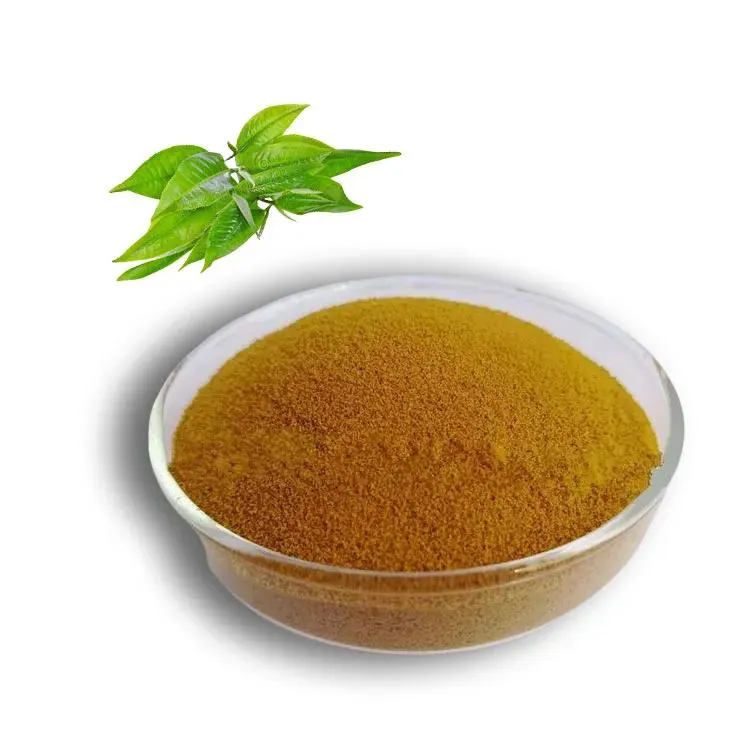- 0086-571-85302990
- sales@greenskybio.com
Organic non - transgenic green tea extract.
2024-11-29

1. Introduction to Organic Non - Transgenic Green Tea
Green tea has been a staple in many cultures for centuries, known for its refreshing taste and numerous health benefits. Organic non - transgenic green tea takes this a step further. It is grown without the use of synthetic pesticides, fertilizers, or genetically modified organisms (GMOs). This ensures that the tea is pure and free from potential contaminants associated with non - organic or transgenic cultivation methods.
Organic farming practices for green tea involve using natural fertilizers like compost and manure, and natural pest control methods such as introducing beneficial insects. This not only protects the environment but also results in a higher - quality tea leaf. The non - transgenic aspect means that the tea plants have not been genetically engineered, preserving their natural genetic makeup.

2. The Composition of Green Tea Extract
The Green Tea Extract is rich in a variety of chemicals. One of the most well - known components is tannins. Tannins are a type of polyphenol that gives green tea its astringent taste. They also have antioxidant properties, which can help protect the body's cells from damage caused by free radicals.
Another important group of substances in Green Tea Extract are alkaloids. The most prominent alkaloid in green tea is caffeine. Caffeine is a stimulant that can increase alertness and improve concentration. However, green tea also contains other alkaloids such as theanine, which has a calming effect. This unique combination of caffeine and theanine in green tea gives it a different kind of "energy boost" compared to coffee, as it can provide both stimulation and relaxation simultaneously.

3. Health Benefits of Organic Non - Transgenic Green Tea Extract
3.1 Blood Sugar Regulation
Studies have shown that organic non - transgenic green tea extract may play a role in regulating blood sugar levels. For diabetic patients, this can be extremely beneficial. The mechanisms behind this are not fully understood, but it is believed that the polyphenols in the extract may improve insulin sensitivity. Insulin is a hormone that helps the body's cells take up glucose from the blood. By enhancing insulin sensitivity, green tea extract may help the body use glucose more effectively, thus keeping blood sugar levels in check.
3.2 Mental Well - being
The impact of green tea extract on mental well - being is also significant. As mentioned before, theanine, an alkaloid in green tea, has a calming effect. It can help reduce stress and anxiety. In today's fast - paced world, stress is a common problem, and finding natural ways to combat it is highly desirable. Drinking green tea or taking green tea extract supplements may be a simple and effective way to relax the mind.
Furthermore, the caffeine in green tea can improve cognitive function. It can enhance memory, attention, and reaction time. This combination of stress - relieving and cognitive - enhancing effects makes green tea extract a valuable addition to maintaining good mental health.

4. Use in the Cosmetic Industry
In the cosmetic industry, organic non - transgenic green tea extract has found wide applications. One of its main uses is in skincare products.
4.1 Moisturizing Effects
The tannins in green tea extract can help to moisturize the skin. They form a thin layer on the skin's surface, which helps to prevent water loss. This is especially important for maintaining healthy, hydrated skin. Dry skin can lead to a variety of problems, such as flakiness, itchiness, and premature aging.
4.2 Anti - aging Effects
The antioxidant properties of green tea extract are crucial for its anti - aging effects. Free radicals in the environment can damage the skin's cells, leading to wrinkles, fine lines, and loss of elasticity. By neutralizing these free radicals, green tea extract can help to keep the skin looking youthful and healthy. It can also stimulate collagen production in the skin. Collagen is a protein that gives the skin its structure and firmness. As we age, collagen production decreases, and using products containing green tea extract can help to slow down this process.
5. Significance in the Agricultural Field
Surprisingly, organic non - transgenic green tea extract also has value in the agricultural field.
5.1 As a Natural Pesticide
Some of the compounds in green tea extract can act as natural pesticides. They can repel or inhibit the growth of certain pests and insects. This provides an alternative to synthetic pesticides, which can have negative impacts on the environment and human health. Using green tea extract as a natural pesticide is a more sustainable approach, as it is biodegradable and less likely to cause harm to non - target organisms.
5.2 Soil Improvement
Green tea extract can also have a positive impact on soil quality. When added to the soil, it can enhance soil fertility. The tannins and other organic compounds in the extract can improve soil structure, allowing for better water retention and root growth. This can lead to healthier plants and higher crop yields in the long run.
6. Conclusion
In conclusion, organic non - transgenic green tea extract is a truly remarkable natural resource. Its diverse range of applications, from health benefits to uses in the cosmetic and agricultural industries, make it a valuable commodity. The continued research and development of green tea extract will likely uncover even more potential uses and benefits in the future. As consumers become more aware of the importance of natural and sustainable products, the demand for organic non - transgenic green tea extract is expected to grow.
FAQ:
What are the main components in organic non - transgenic green tea extract?
Organic non - transgenic green tea extract contains valuable chemicals such as tannins and alkaloids.
How does organic non - transgenic green tea extract benefit diabetic patients?
It has been studied for its ability to regulate blood sugar levels, which is beneficial for diabetic patients.
What are the effects of organic non - transgenic green tea extract on mental well - being?
It has a positive impact on mental well - being and potentially reduces stress and anxiety.
Why is organic non - transgenic green tea extract used in skincare products?
It is used in skincare products for its moisturizing and anti - aging effects.
How can organic non - transgenic green tea extract be used in the agricultural field?
It can be used as a natural pesticide in some cases in the agricultural field.
Related literature
- The Health Benefits of Organic Green Tea Extract"
- "Green Tea Extract in Cosmetics: Properties and Applications"
- "Organic Green Tea Extract as a Natural Pesticide: A Review"
- ▶ Hesperidin
- ▶ citrus bioflavonoids
- ▶ plant extract
- ▶ lycopene
- ▶ Diosmin
- ▶ Grape seed extract
- ▶ Sea buckthorn Juice Powder
- ▶ Beetroot powder
- ▶ Hops Extract
- ▶ Artichoke Extract
- ▶ Reishi mushroom extract
- ▶ Astaxanthin
- ▶ Green Tea Extract
- ▶ Curcumin Extract
- ▶ Horse Chestnut Extract
- ▶ Other Problems
- ▶ Boswellia Serrata Extract
- ▶ Resveratrol Extract
- ▶ Marigold Extract
- ▶ Grape Leaf Extract
- ▶ blog3
- ▶ blog4
-
Standard - process green tea extract.
2024-11-29
-
100% Organic Calendula Extract.
2024-11-29
-
Polygonum Cuspidatum Extract
2024-11-29
-
Kelp Extract Powder
2024-11-29
-
Motherwort Extract
2024-11-29
-
Sophora Flavescens Root Extract
2024-11-29
-
Phellodendron Extract
2024-11-29
-
melatonin extract
2024-11-29
-
Gynostemma pentaphyllum extract
2024-11-29
-
Sea buckthorn Juice Powder
2024-11-29
-
Eyebright Extract
2024-11-29
-
Soy Extract
2024-11-29





















